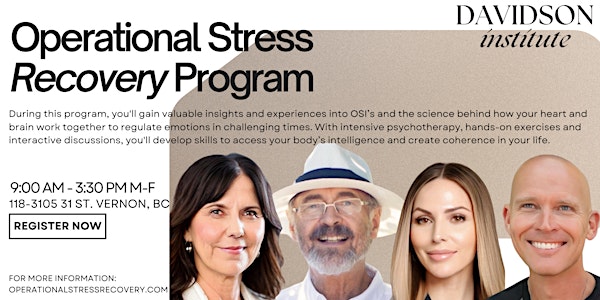
Couples 1-week Operational/Occupational Stress Recovery Program
Join us for a program designed specifically for Veterans and first responders to overcome OSI-related challenges impacting relationships.
Date and time
Location
The Davidson Institute | Operational Stress Recovery Program
114-3105 31 Street Vernon, BC V1T 5H9 CanadaAbout this event
- 4 days 6 hours
VAC APPROVED - Contact us for details on how to apply.
Other insurance may provide funding or partial coverage for this program.
We operate out of the Davidson Institute, founded by Dr. Gordon Davidson, a registered psychologist in BC with over 40 years of experience treating first responders and veterans in managing traumatic stress injuries. Dr. Davidson developed a profound understanding of this population and culture throughout his career. Building upon this competence and expertise, he created a comprehensive, multidisciplinary treatment program, incorporating elements proven effective in treating PTSD.
Sadly, Dr. Davidson passed away in 2018, but his team and family have continued his important work. For about 10 years now, we have solely worked with first responders and veterans diagnosed with PTSD. In these years, a lot of amazing research has emerged, supporting Dr. Davidson's hypotheses, which blend ancient wisdom with contemporary practices from various theoretical approaches and cultures. In fact, Dr. Davidson was instrumental in introducing mindfulness and meditation to the BC mental health commission in the 70s, pioneering a more somatic and holistic approach to mental health.
Our approach, though rich in terminology (and I apologize for the therapy speak!), follows the trauma informed practitioner-scholar-advocate-leaders model. This is an advanced educational and operational model that is focused on the practical application of scholarly knowledge, while effectively meeting the needs of clients whose presenting problems are rooted in a sociocultural context. In the same vein, we adopt a relational-cultural approach that recognizes the crucial role of relationships in well-being.
The Five Guiding Principles of the Trauma Informed Protocol are; safety, choice, collaboration, trustworthiness and empowerment. Ensuring that the physical and emotional safety of an individual is addressed is the first important step to providing Trauma-Informed Care.
We view clients through a Biopsychosocial lens, which suggests that biological, psychological (which entails thoughts, emotions, and behaviours), and social factors, all play a significant role in human functioning in the context of disease or illness.
We emphasize a respect-focused, somatic-leaning approach, prioritizing methods that engage the nervous system, what is referred to as “bottom-up”, as well as incorporating cognitive components, what is referred to as “top down”. In our program, we combine traditional talk or cognitive therapy and EMDR (we’ll touch more on this later), followed by sessions on self-regulation techniques. We maintain a culturally informed and socially just perspective that respects each person's identity and lived experience, recognizing that our clients are experts in their lives. We walk alongside our clients, helping clients to find their innate healing capacity, strengths, abilities, and facilitating empowerment, a key factor in our approach, as trauma often robs individuals of control.
Our practice also involves the 'REPLAN' method of treatment planning, which involves building a strong therapeutic relationship, formulating the goals of treatment, and then matching the client's goals and presenting concerns with one of the common factors (e.g., enhancing efficacy and self-esteem).
Our small group sizes allow us to adapt and modify our treatment plans based on client feedback, emphasizing autonomy and empowerment. Autonomy is crucial for processing the hard work of therapy, which led us to house participants in individual suites at a nearby lodge, rather than a shared residence or hospital setting. This environment, complete with a creek and an atrium filled with trees, has proven to be healing and conducive to our work.
Our mission is deeply personal: to save lives. We haven't lost a client to suicide who's attended our program yet, and that is statistically significant – meaning we are achieving this important goal. Our clients, who've served and sacrificed so much and shown immense courage, deserve the utmost respect and the best care to help them truly heal on a cellular level, reclaim their power, and step back into the role that drew them to this work in the first place – being of service to others.